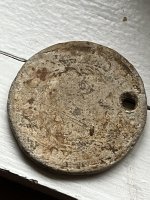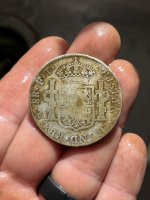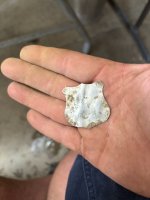Gypsy Heart
Gold Member
In the spring of 1865 Gen. Isaac R. Sherwood was stationed with his regiment near Salisbury, NC. He recounts the following incident in his 1923 book "Memories of the War":
Bankers and business men of the South never were unanimous for the Southern Confederacy. The drastic conscription laws, drafting into the army all able-bodied men from 18 to 50, crated wide opposition. Many leading bankers failed to surrender their gold and silver for Confederate bonds. For instance, the bank of Newbern, North Carolina, took $75,000 in gold and silver at the outset of the war and buried it in jugs in a grove near Salisbury, N.C. Nearly all that gold drifted into Ohio after the war and the story is interesting, even after a lapse of 58 years.
On Sherman’s famous march through Georgia and South Carolina his foragers lived on the country and they contracted the habit of grabbing everything in sight, from a silver spoon to a brindle cow. And prudent people on the line of march adopted a habit of burying silverware and gems. Hence the soldiers contracted an early habit of digging for things.
An Ohio cavalry regiment in May, 1865, while the peace angel was brooding over the fair fields and forests of North Carolina, went into camp near Salisbury in the grove where the $75,000 was buried. Digging was still a habit and while one of the cavalrymen was running his sabre into the earth he struck something metallic, which induced him to dig – and he struck a brown jug – well corked. He knocked off the neck of the jug with his carbine and $4,000 in gold and silver was discovered. News of the discovery spread through the camp. There were 17 jugs and a wild scramble ensued among the soldiers of the regiment for the treasure. Comrade Harkness of Norwalk, OH, told me after the war that this was the most exciting, enthusiastic and joyous day the regiment ever experienced. When a new jug was dug out there would be a wild scramble for the gold. About $15,000 was in one dollar gold pieces and the sand and earth and torn sod would all be flying in the air together. It was a case of the survival of the fittest. The strongest and most alert cavalryman got the most gold. Colonel Sanderson of Youngstown, OH was colonel of the regiment. He arrived at the exciting contest when nearly all the precious stuff had been muscularly distributed.
Some friends in Salisbury telegraphed the bank of Newbern of the discovery of the treasure and three days later the officers of the bank appeared in Salisbury demanding the gold. At that time gold was scarce in North Carolina. Of course there was an investigation, but no laws were in force in North Carolina then. There were no courts, no sheriffs, no recognized machinery of civil government.
Our army (the Second Brigade) was encamped six miles from the previous grove. A few days later I received an invitation from Colonel Sanderson to enjoy a Sunday dinner with him in camp. As I was leaving his camp a captain of his regiment from Northwestern Ohio called me into his tent with the inquiry “How much greenback money have you?” I told him I was short, as the paymaster hadn’t arrived. He said: “I will give you gold dollars for every dollar you have in greenbacks.” He took me to the rear of his tent and showed me a cavalry boot nearly full of gold dollars.
There was an investigation by a body of military officers, but so many of the investigating committee were encumbered with this gold that they failed to find any amount to return to the bankers. Comrade Harkness, who gathered a valuable bunch of this shining stuff, told me after the war that nearly all the boys who dug up the treasure landed it safely in Ohio at the muster out.
The ethical quality of the argument for keeping the coin never appealed to me. The claim was that as the bank had refused to surrender the gold to the Confederate government, as required by law of the Confederate congress, and buried it, it forfeited all right to recovery. The soldiers claimed the money by right of discovery. They also said the bank lost nothing, because if it had accepted Confederate bonds for the gold it would have lost just the same, as Confederate bonds were worthless.
Bankers and business men of the South never were unanimous for the Southern Confederacy. The drastic conscription laws, drafting into the army all able-bodied men from 18 to 50, crated wide opposition. Many leading bankers failed to surrender their gold and silver for Confederate bonds. For instance, the bank of Newbern, North Carolina, took $75,000 in gold and silver at the outset of the war and buried it in jugs in a grove near Salisbury, N.C. Nearly all that gold drifted into Ohio after the war and the story is interesting, even after a lapse of 58 years.
On Sherman’s famous march through Georgia and South Carolina his foragers lived on the country and they contracted the habit of grabbing everything in sight, from a silver spoon to a brindle cow. And prudent people on the line of march adopted a habit of burying silverware and gems. Hence the soldiers contracted an early habit of digging for things.
An Ohio cavalry regiment in May, 1865, while the peace angel was brooding over the fair fields and forests of North Carolina, went into camp near Salisbury in the grove where the $75,000 was buried. Digging was still a habit and while one of the cavalrymen was running his sabre into the earth he struck something metallic, which induced him to dig – and he struck a brown jug – well corked. He knocked off the neck of the jug with his carbine and $4,000 in gold and silver was discovered. News of the discovery spread through the camp. There were 17 jugs and a wild scramble ensued among the soldiers of the regiment for the treasure. Comrade Harkness of Norwalk, OH, told me after the war that this was the most exciting, enthusiastic and joyous day the regiment ever experienced. When a new jug was dug out there would be a wild scramble for the gold. About $15,000 was in one dollar gold pieces and the sand and earth and torn sod would all be flying in the air together. It was a case of the survival of the fittest. The strongest and most alert cavalryman got the most gold. Colonel Sanderson of Youngstown, OH was colonel of the regiment. He arrived at the exciting contest when nearly all the precious stuff had been muscularly distributed.
Some friends in Salisbury telegraphed the bank of Newbern of the discovery of the treasure and three days later the officers of the bank appeared in Salisbury demanding the gold. At that time gold was scarce in North Carolina. Of course there was an investigation, but no laws were in force in North Carolina then. There were no courts, no sheriffs, no recognized machinery of civil government.
Our army (the Second Brigade) was encamped six miles from the previous grove. A few days later I received an invitation from Colonel Sanderson to enjoy a Sunday dinner with him in camp. As I was leaving his camp a captain of his regiment from Northwestern Ohio called me into his tent with the inquiry “How much greenback money have you?” I told him I was short, as the paymaster hadn’t arrived. He said: “I will give you gold dollars for every dollar you have in greenbacks.” He took me to the rear of his tent and showed me a cavalry boot nearly full of gold dollars.
There was an investigation by a body of military officers, but so many of the investigating committee were encumbered with this gold that they failed to find any amount to return to the bankers. Comrade Harkness, who gathered a valuable bunch of this shining stuff, told me after the war that nearly all the boys who dug up the treasure landed it safely in Ohio at the muster out.
The ethical quality of the argument for keeping the coin never appealed to me. The claim was that as the bank had refused to surrender the gold to the Confederate government, as required by law of the Confederate congress, and buried it, it forfeited all right to recovery. The soldiers claimed the money by right of discovery. They also said the bank lost nothing, because if it had accepted Confederate bonds for the gold it would have lost just the same, as Confederate bonds were worthless.






